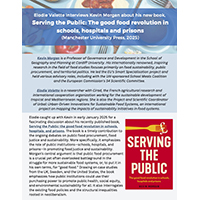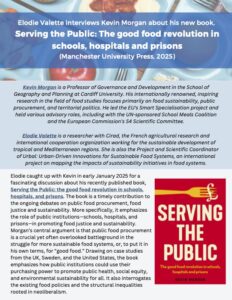In January 2025, Elodie Valette—a researcher with Cirad, the French agricultural research and international cooperation organization—interviewed Kevin Morgan about his work leading up to the publication of his book, Serving the Public: the good food revolution in schools, hospitals, and prisons.
The book is a timely contribution to the ongoing debates on public food procurement, food justice and sustainability. More specifically, it emphasizes the role of public institutions—schools, hospitals, and prisons—in promoting food justice and sustainability.
Elodie: Why did you choose to write a book about this topic, and especially about what you call “good food” in public spaces?
Kevin: Originally, I never planned to work in the food sector. My background was more in urban and regional development. But then, around the turn of the century, I came across a project in rural Wales that caught my attention. A group of farmers, health professionals, and civil society campaigners tried to introduce local food into a local hospital. Unfortunately, it was a total failure. I found this intriguing because, on paper, it made so much sense. Nutritious, fresh, local food for patients or students—why wouldn’t that work? I contacted the project leaders, and we started discussing the reasons behind its failure. Eventually, we launched a new project to look into public procurement and its surrounding regulations. It was what we called “a labor of love”—we didn’t have any funding, but it was a meaningful project. After about a year and a half, we produced our first report, and surprisingly, it gained a lot of attention. People were suddenly interested in local food and the re-localization of the food system.
Elodie: Why did you choose the term “good food” instead of “sustainable food”?
Kevin: In academia, we often use terms that seem simple and well understood, but in the general public, they can be quite confusing. Words like “net zero,” “1.5 degrees,” or even “sustainability” can be interpreted in many ways. Sustainability, in particular, is a term full of trade-offs, and I try to address that in the book.








